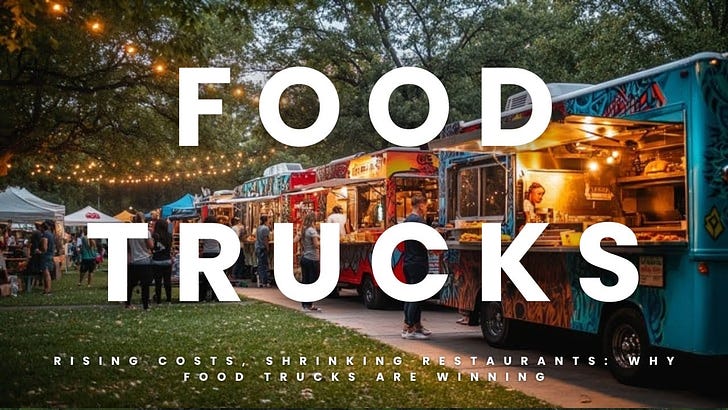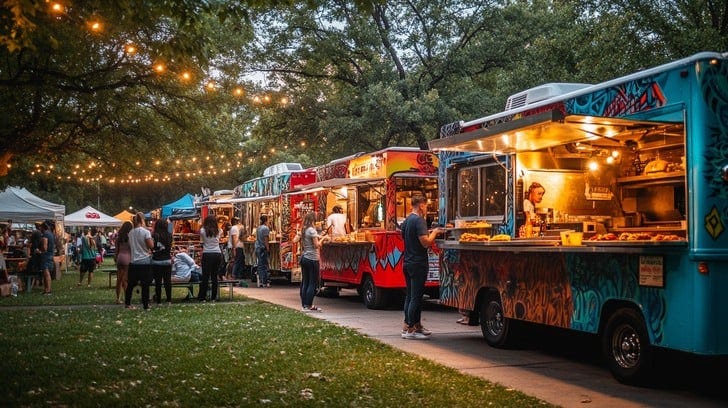Food Trucks: The Future of Restaurants Amid Rising Costs
As food costs and rent soar, food trucks offer a cost-effective solution. Learn why they're the future of the restaurant industry.
You are seeing it all over the place, in person, on social media, in the news. Restaurants are closing left and right. There are many factors that are hitting the hospitality industry hard, whether you are looking at the rising costs of food, the rising cost of rent, labor increases, etc. It’s hard to own a restaurant right now and that’s why many are having to just close their doors and salvage what they can because they are no longer viable businesses.
Just this year, national chains like Red Lobster had to file bankruptcy. Here in Nashville, many local groups have had to shutter their doors, some of which were long-time staples in the community. In my hometown of Evansville, Indiana, the story is no different. If you are a foodie, regardless of where you live, this trend is prevalent.
Where does the hospitality industry go from here? How do those in the industry attempt to pivot and stay afloat? Rising inflation with food costs, rent, and labor are most likely not going to decrease at any point soon. If the theory of brick-and-mortar restaurant locations are fading into the sunset, what’s one way to stay in the industry while reducing costs and focusing on your product and brand? Food trucks.
The Food Truck industry has grown at 18.4% on average between 2018-2023. In 2023, there were 52,624 registered food trucks according to IBIS World. Some are projecting the Mobile Food Truck industry to grow from 3.1 billion in 2024 to 11.3 billion by 2032.
The average rent for a brick-and-mortar restaurant in the United States is roughly $6,000 with that ebb-and-flowing depending on your location. Interest rates have skyrocketed in recent years, driving up the cost of financing for brick-and-mortars which often become money pits that you are spending in a space you do not own (yes you have tax benefits with leasehold improvements, but it’s not the same as investing in a building you own). All of these point towards the trend in both the cost effectiveness and flexibility that owning a food truck can give you.
One company that I follow closely is Aero Build. Aero Build is a mobile business trailer manufacturer here in Nashville. You can build out a trailer for less than or around $40,000, while you can upgrade that depending on the packages you wish. The mobile coffee industry has flocked to the company providing a much more cost effective path towards building a coffee brand without spending hundreds of thousands on a brick-and-mortar in an already saturated market.
Depending on the type of business you are opening, you could open a mobile food truck for anywhere between $50,000 and $200,000. The more complicated of a business you are trying to run, the more specialized equipment you’ll have to purchase which will drive costs up. Your location will cost a variance in permits, licensing, and legal work. Regardless, if you want to bootstrap it with the bare minimum, you absolutely can. For comparison, the average cost of opening a brick-and-mortar restaurant will run you anywhere between $150,000-$1,000,000 or more.
With the age of social media, you can make an argument that the idea of full-service restaurants are going to continue to dwindle. Marketing and growing your brand can now be driven solely by social media, whereas when you have a brick-and-mortar, you have to convince people on a daily basis to come out of their way to your location. With a food truck, you are putting your brand in front of people both online through social media and the different locations you setup every day.
Some companies are actually pivoting strongly towards this market. Cousins Maine Lobster currently has 50 food trucks operating across 20 different states. Kona Ice is one you might be more familiar with as there are over 1,800 trucks in the United States. Some big brands that have invested in food trucks over the last couple of years include both Shake Shack and Whataburger.
Private Equity and VC investments are rolling into companies like Roaming Hunger that offer services specifically for the Food Truck industry. Goodfynd functions as a marketplace and payment platform for businesses in the industry as well, backed by some impressive past fundraising rounds. Tech is starting to pop up around the industry, representing the growing interest around a market that is only going to continue to grow.
Between the reduced cost of entry for people looking at starting food trucks while reducing general overhead from high and continuously rising rent, labor, and interest the Food Truck Industry is poised to takeoff. While the traditional brick-and-mortar restaurants will not completely disappear, the flexibility and potential higher margins will be hard to ignore for those looking to enter or are already a part of the hospitality industry.
What are your thoughts? Do you think Food Trucks are going to continue growing rapidly? Do you think that brick-and-mortar restaurants are still the best bet? Let us know in the comments.




